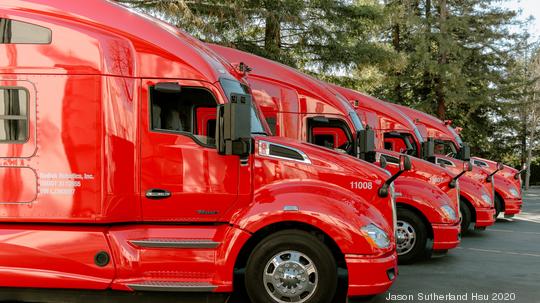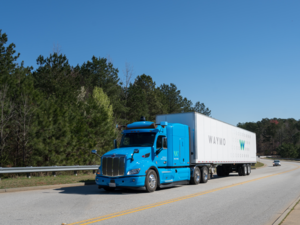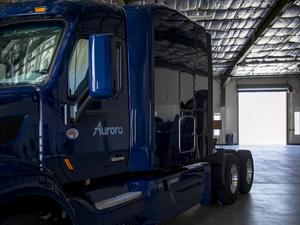
The Dallas area is getting the attention of the driverless trucking industry – and yet another company is looking to expand in the region.
More key players in the market are investing in the region as they see opportunities to try out their technology in North Texas. That often means setting up operations and hiring local folks for the autonomous vehicles, or AVs, as travel on nearby roads.
Waymo – part of Google parent Alphabet and a pioneer in driverless -- is setting up a hub in the Dallas area for its trucking effort, a spokesperson said last month. In July, Aurora, an Amazon-backed firm, that said it would set up an operation in North Texas, first with minivans and then larger semi-trucks.
And yet another company is eyeing more for the region. Embark – which has raised more than $100 million – sees opportunities ahead for North Texas, according to Monika Darwish, policy counsel for the company. It previously tested on the state’s roads, though it’s been keeping that closer to a hub in California of late.
“The Dallas-Fort Worth region is ripe for the nation's first deployment of automated commercial motor vehicles given the sheer volume of freight it sees, its location along major freight corridors, and the willingness of Texas lawmakers to engage in meaningful discussions on safety and education,” Darwish said. “The region is a high priority on our roadmap, and we look forward to building out facilities there soon to add to our transfer hubs in California and Arizona.”
And there are more. Kodiak Robotics announced last year it will be supporting its growing testing and freight operations from a facility in Lancaster. Then there’s TuSimple, which in July said it will open a new shipping terminal in North Texas after operating autonomously on seven different routes between cities that include Dallas.
“I think it would be hard to argue that Dallas isn't the clear operations hub at this point,” said Daniel Goff, head of policy for Kodiak.
The Dallas areas is benefitting from its traditional role a key trucking area while providing policy at the state level that’s friendlier to driverless technology than some areas. The reputation for a business-friendly environment doesn’t hurt either.
It puts North Texas in the mix for what could be a key – and more quickly embraced – part of driverless tech. The trend is a good one for North Texas, helping to expand the shipping sector for the future, Thomas Bamonte, senior program manager, Automated Vehicles North Central Texas Council of Governments.
“Automated trucking is part of a larger effort to automate warehouses, freight yards, last-mile freight delivery, etc.,” Bamonte said. “DFW has to be at the forefront of technology innovation in the freight sector.”
With Waymo, the new investment comes after the company earlier this year said it would be testing the technology in Texas and New Mexico.
“Waymo has clearly put a stake in the ground by saying that DFW and Texas are critical to them,” Goff said. “Given we made South Dallas our home for testing and development, we see it as a great validator for our approach.”
Kodiak is backed by some big names as well, including Battery Ventures, CRV and Lightspeed, and is working to bolster the opportunity by using the driverless technology on the more predictable and less dynamic highways. It's focusing on AVs that are used between a drop-off or pick-up sites that can include more technical challenges.
Aurora is a company with more than $690 million in funding – and it’s led by an executive whose name, Chris Urmson, is familiar to the self-driving industry as a longtime player. He led the self-driving car effort at Google before co-founding his new company in 2017.
Like all new technologies nothing is certain. An early player in the Dallas region was Starsky, which quietly opened up a shop here in 2018. Yet earlier this year, the CEO, Stefan Seltz-Axmacher, announced the company was shutting down, citing issues such as a lack of investor interest and challenges in the trucking industry.
A key for Texas – and a help for Dallas – has been legislation passed in 2017, giving strong policy coverage for the industry, Bamonte said. Also, The Regional Transportation Council recently approved a program to optimize the movement of freight vehicles between freight hubs and expressways – another signal to the industry that DFW is supportive of AVs and related transportation technologies.
“DFW’s status as a major and growing freight hub is attractive for AV developers, who are looking to transition from technology testing to building viable freight businesses,” Bamonte said.
Autonomous trucking could driver greater adoption of driverless technology than its cousins with passenger vehicles, according to Antti Lindstrom, an analyst with IHS Markit.
“They are in neighborhoods where there’s not a lot of residential traffic,” Lindstrom said. “The whole operating patterns are easier to predict with the commercial vehicles.”
Highways are relatively simple to drive, given they normally don’t have pedestrians and bicyclists, Kara Kockelman, a professor at the University of Texas at Austin, said. At the same time, semi trucks also just see a lot more time on roads. There is a lot of “value to be gained from automation," Kockelman said.
Today's drivers are limited by rules that keep them away from the wheel for safety reasons a certain number of hours in a given day. With driverless, the person could be doing administrative tasks or even sleeping during the long stretches – and then engage on local streets, Kockelman said.
Whatever emerges with the technology’s future, North Texas can have a role.
“This very positive development indicates the strength of DFW’s freight sector and the willingness of the public and private sectors in DFW to work together to support technology innovation that will help DFW compete successfully in the global economy,” Bamonte said.





